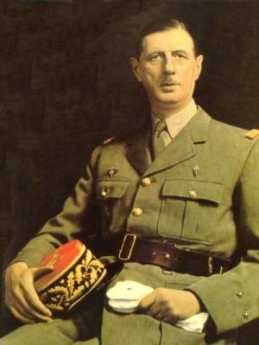Related Topics
Federalism Slowly Conquers the States
Thirteen sovereign colonies voluntarily combined their power for the common good. But for two hundred years, the new federal government kept taking more power for itself.
As Others See Us
Americans are rightly proud of their Constitution, an achievement no one seems able to match. It's rude to point it out, but some Americans are just a little condescending about Europe's protracted examination of a federal union, and the World's plain inability to design a United Nations Charter that everyone can warm to.

|
| Charles de Gaulle |
But just a minute, look at the centuries of history we have compiled. After eighty years, the American union broke apart in the bloodiest war in our history, proportional to the population at the time. After another century it was safe to suppose we were past that episode, at least mostly.
And if you were an elected representative of one of the European states, charged with assuring a fair result for your constituents, you would have to warn them of something America seems to demonstrate. The new federal government at first had to be deferential to the various states, in order to persuade them to ratify the document. It wasn't an easy sell, and a promise had to be made and reiterated that every single power being surrendered was absolutely necessary for the common welfare of all. And it was necessary to repeat the promise in the Tenth Amendment, that nothing more was being given, nothing up our sleeve. The Eleventh Amendment which followed soon afterward could even be described as a test of sincerity. The states demanded something they really should have been ashamed to ask for, but it was given to them as a demonstration who was still boss. The Federalist party soon broke apart, and had to become craven, only persisting in the assertion of powers it was absolutely clear states needed to give up.
But soon after that, the federal government has never ceased to nibble away at the cheese. Step by step, gradually but relentlessly, power has shifted from state capitals to the District of Columbia. It is now possible to say without serious contradiction that state legislatures really don't have much to do of any importance. Is that the lesson European officials are learning from our history?
Maybe not, but Charles de Gaulle once made a wisecrack suggesting another answer. He wanted to go to Heaven, he said. He really did. But he was definitely in no hurry to get there.
Originally published: Thursday, June 18, 2009; most-recently modified: Monday, May 13, 2019